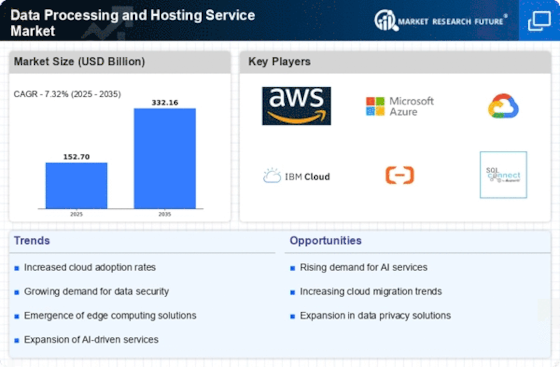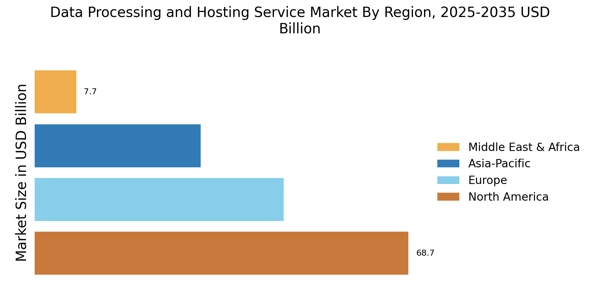Emergence of Edge Computing
The Data Processing and Hosting Service Market is witnessing a transformative shift with the emergence of edge computing. This technology allows data processing to occur closer to the source of data generation, reducing latency and enhancing real-time analytics capabilities. As industries such as manufacturing and healthcare adopt edge computing solutions, the demand for hosting services that support this architecture is likely to increase. The edge computing market is anticipated to grow significantly, which in turn will drive the Data Processing and Hosting Service Market to adapt and innovate. Service providers must evolve their offerings to accommodate the unique requirements of edge computing.
Expansion of E-commerce Platforms
The Data Processing and Hosting Service Market is significantly influenced by the rapid expansion of e-commerce platforms. With the rise of online shopping, businesses are increasingly seeking robust data processing and hosting solutions to manage their digital operations effectively. The e-commerce sector is projected to grow at a compound annual growth rate of around 20%, necessitating scalable and reliable hosting services. This growth compels service providers to enhance their infrastructure and capabilities, ensuring they can accommodate the increasing volume of transactions and data generated by e-commerce activities. As a result, the Data Processing and Hosting Service Market is poised for substantial growth.
Regulatory Compliance Requirements
The Data Processing and Hosting Service Market faces mounting pressure from regulatory compliance requirements. Organizations are compelled to adhere to stringent data protection regulations, such as GDPR and CCPA, which necessitate robust data processing and hosting solutions. This compliance landscape drives demand for services that ensure data security and privacy. As businesses navigate these complex regulations, they increasingly rely on specialized service providers to manage their data in accordance with legal standards. The need for compliance is expected to propel growth in the Data Processing and Hosting Service Market, as companies prioritize secure and compliant data handling practices.
Increased Demand for Data Analytics
The Data Processing and Hosting Service Market experiences a notable surge in demand for data analytics services. Organizations are increasingly recognizing the value of data-driven decision-making, leading to a projected growth rate of approximately 25% annually. This trend is fueled by the need for businesses to derive actionable insights from vast amounts of data. As companies strive to enhance operational efficiency and customer engagement, the reliance on data analytics becomes paramount. Consequently, service providers in the Data Processing and Hosting Service Market are expanding their offerings to include advanced analytics capabilities, thereby catering to this growing demand.
Growing Importance of Data Sovereignty
The Data Processing and Hosting Service Market is increasingly shaped by the growing importance of data sovereignty. Organizations are becoming more aware of the legal implications of data storage and processing across borders. This awareness drives demand for localized data processing and hosting solutions that comply with regional regulations. As businesses seek to mitigate risks associated with data transfer and storage, service providers are responding by offering solutions that ensure data remains within specific jurisdictions. This trend is likely to influence the Data Processing and Hosting Service Market, as companies prioritize sovereignty in their data management strategies.

















